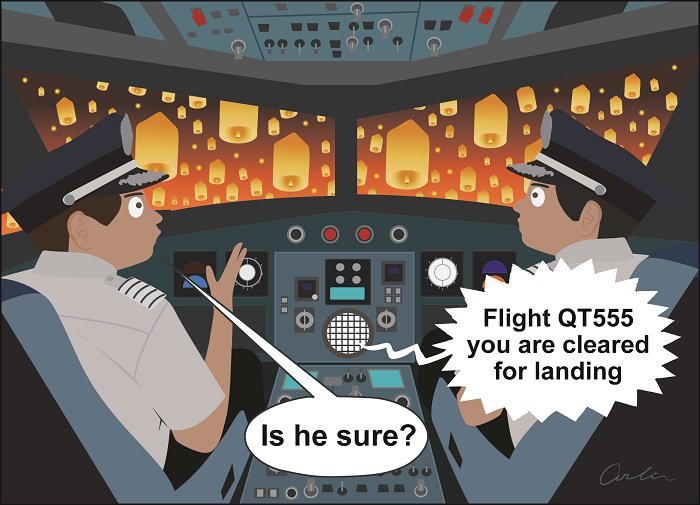Opinion: Great balls of fire – sky lanterns a hazard over Phuket

PHUKET: Among the many recent edicts that have been issued by the government to bring some order to Phuket’s beach tourism industry, one that the Gazette hopes can be comprehensively enforced is the ban on the sale of khom loi, or sky lanterns, at public beaches (story here).
The Gazette concedes that the sight of khom loi slowly rising after twilight in the night sky can have a definite visual appeal, and that their ritual release, thought to have originated in China, is also spiritually significant to a certain segment of the local population as well as some of our foreign guests.
Unfortunately, their proliferation over the past decade as a result of mass tourism poses definite safety and environmental risks, because whatever goes up must come down.
The lanterns eventually fall to the ground or into the sea, resulting in another annoying increment to an island already reeling under a huge solid-waste disposal crisis and damage to its coastal marine ecosystems.
Reports of khom loi causing major fires and property damage in Phuket have yet to appear, but the risks are evident.
An inferno at a plastics recycling plant in the West Midlands of England in June 2013, presumed to have been set off by a sky lantern, caused an estimated £6 million in damages, put three firefighters in hospital and caused local authorities there to overhaul codes relating to the lanterns’ commercial sale.
Phuket has had no lack of major fires over the years, including the SuperCheap inferno in Rassada in October 2013, which occurred on an unusually calm and clear night during the monsoon season.
However, the frequency of release of khom loi locally is at its highest during the high season for tourism, which generally tends to coincide with the driest time of the year on the island, when the threat of forest fires and property blazes is at its highest.
It is probably safe to say that Phuket has been lucky not to have had any major fires caused by descending sky lanterns and that we should “quit while we are ahead” on this matter.
Khom loi also pose serious risks to commercial aviation, which is why their release into the Air Safety Zone surrounding Phuket International Airport could result in charges carrying a sentence of up 20 years of imprisonment, or even death under Section 6(3) of Thailand’s Air Navigation Act of 1954.
Unlike many other recent edicts – such as the ban on smoking at public beaches – we hope, but do not necessarily expect, that this measure can and will be comprehensively enforced by the police, with the support of local authorities from every town and village on the island.
Latest Thailand News
Follow The Thaiger on Google News:


























